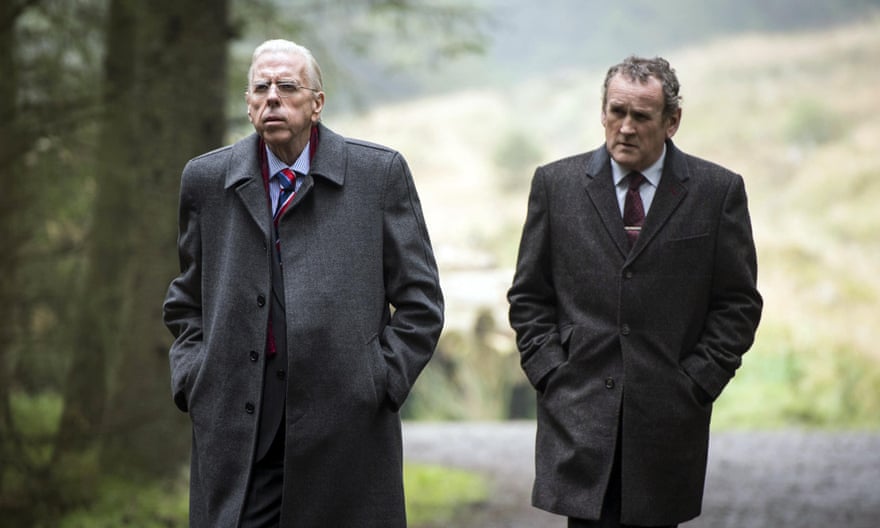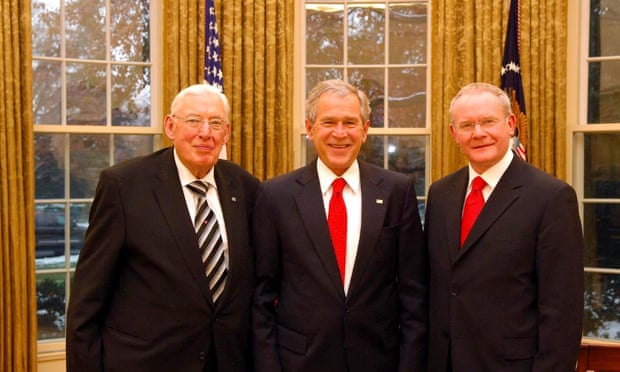Colm Meaney Guardians Of The Galaxy
A s a Dubliner who has lived in Los Angeles for three decades, Colm Meaney says he e'er keeps an centre out for Irish scripts – but he confesses to a slight feeling of dread when ane lands on his chump. Cliched characters, simplistic politics, shonky dialogue – he'south seen them all. The 63-yr-old has been lucky with some – particularly the trilogy of Roddy Doyle adaptions that began with 1991's The Commitments and won him a Gold World nomination for The Snapper two years afterwards – and less blest with others that have come his way. "Oh yes. Mentioning no names but … oh yeah."
And then when he outset heard virtually the Northern Irish novelist Colin Bateman's script for a drama virtually Ian Paisley and Martin McGuinness, with the latter role potentially his, he says: "My ears pricked upwards immediately, only I thought – this could be difficult". Meaney knew and liked McGuinness and supported him politically – he hosted a rally for the late Sinn Féin political leader's unsuccessful campaign to be Irish president in 2011. Reading the script was a relief and a thrill, he says. "You lot felt they had actually got the complication of Irish politics, the complexity of the characters, the humour of these two men." By the time he got to the finish, "I badly wanted to do it."
Certainly the flick, the brainchild of its managing director Nick Hamm and entitled The Journey, offers Meaney and his co-star Timothy Spall, unrecognisable as Paisley, plenty to go their teeth into. It also tells one version of an extraordinary story, one that however has close observers of Northern Irish gaelic politics scratching their heads and asking: "Did that really happen?"
In October 2006, when the motion picture is set, Paisley was the bombastic leader of the Autonomous Unionist party, the elderly Presbyterian prophet-firebrand who had railed against the Good Fri agreement, which put in place a ability-sharing arrangement between the province'southward bitterly divided tribes, as "the greatest expose ever foisted on the unionist people". McGuinness was the former senior IRA man who had helped pb his republican party to peaceful negotiations, simply remained unrepentant for his past. The two men, McGuinness told Hamm every bit he was researching the film, had never exchanged a word; Paisley refused even to acknowledge McGuinness's presence if they passed each other in a corridor.
And yet, seven months afterwards, Paisley and McGuinness were sworn in as the offset minister and deputy first minister of a devolved associates in Northern Ireland. Even more astonishingly, out of mutual loathing came a boyish friendship that earned them the nickname "the Chuckle Brothers". Paisley died in 2014. When McGuinness likewise died last month, the unionist leader'south son revealed that the two men'due south deep mutual affection had continued fifty-fifty later they stopped working together.

How on earth did it happen? Nobody really knows. They certainly didn't go from frost to thaw in the space of a unmarried machine journey from St Andrews to Edinburgh airport, as the film fictionalises (though the ii men would travel together occasionally, even during tense negotiations, which offered the genesis for Hamm's thought).
Paisley and McGuinness were securely divisive characters in their homeland and much further afield, and the ongoing controversies about the roles they played in Northern Ireland's Troubles didn't end when either human died. McGuinness was praised by many following his death in March for his move from terrorist to peacemaker, just many remained unable to forgive his past or allegations over his involvement in a number of the worst terrorist acts of the flow.
Meaney is firmly in the former military camp, expressing exasperation that McGuinness faced constant questioning during his presidential entrada over his IRA by. "To listen to these fuckers, these revisionists, you would think Martin McGuinness created this situation, that he came up and singlehandedly created a fucking war in Derry. He was born into this."
Spall, though two decades younger than Paisley was in 2006, adopts an alarmingly accurate voice and await as the DUP leader; only Meaney's McGuinness is more of an interpretation than impersonation. McGuinness is probably the more sympathetic of the two characters, reaching out to try to make peace while beingness rebuffed by Spall's righteous reverend (Paisley is surely i of a rare number of characters whom it is almost impossible to overplay). But then, when he expresses remorse for the victims of one bombing atrocity, Paisley scorns his "crocodile tears". Hamm has said he was at pains to brand the film an equally discomfiting watch for those of all political backgrounds in Northern Ireland.
In any event, the ii lead actors conspicuously relished their roles. Meaney and Spall both appeared in 2009'south The Damned United, Meaney playing Don Revie to Spall's Peter Taylor, "simply nosotros didn't really have anything to exercise together, so information technology was actually similar coming together meeting him for the kickoff time", says the Irishman. "And information technology was extraordinary. We didn't have to sit downwards to hash out how he works or how I work, there was none of that. We just eased into it. And fortunately nosotros got on very well, because we were stuck in the dorsum of that motorcar for prolonged periods, in very shut proximity."

Meaney himself was born in 1953, coming into his immature adulthood every bit the Troubles were catching alight 100 miles to the north. "All those events are very clear in my head," he says. "Crystal clear. And I totally, totally understand where McGuinness was coming from when he said that when his community was attacked, he would take been ashamed if he hadn't joined the IRA."
But for his own part, a teenage fellow member of Sinn Féin largely because of its leftwing policies, Meaney says he fiercely opposed the use of violence by the Provisional IRA afterward the republican movement dissever in the late 1960s. "I believed they had to negotiate, and the Provisionals came to that position in the mid-90s. I wouldn't say that to Gerry or Martin though! 'About time, boys!'"
His own active political engagement lapsed every bit he started to get more than into interim, first at the Abbey Theatre School in Dublin, subsequently moving to London where he worked at the Half Moon theatre in the East Stop and with diverse touring companies.
By the early 80s, Meaney had moved to New York ("I loved the energy, simply became enlightened that there wasn't a lot of work apart from daytime soaps. Even Broadway was dead"). He settled in Los Angeles a couple of years later, earning small parts in TV shows such as Moonlighting and Remington Steele and battling for the hard-won breakthrough that wouldn't really come in film until The Commitments. On television his pause was landing the office of Chief Miles O'Brien in Star Trek: The Side by side Generation, a role he played for more than than a decade.
He has remained up to engagement with Irish and British politics, all the same, and makes a betoken of telling me that both he and his wife, French costume-designer Ines Glorian, are paid up Guardian members. "The last twelvemonth and a one-half... here [the UK], the United states, everywhere. It's just extraordinary. Demagoguery seems to dominion again."
Meaney says he has hope for The Journey, however, and its tale of peace and rapprochement. Referring to Paisley, he says: "It takes one of history's peachy demagogues and shows him making this extraordinary journey towards a reconciliation. You lot would promise that that would exist at least an aspirational piece for people to take on board."
- The Journey is in cinemas from v May.
Source: https://www.theguardian.com/film/2017/may/03/colm-meaney-the-journey-martin-mcguinness-interview
Posted by: marquardtaccur1984.blogspot.com

0 Response to "Colm Meaney Guardians Of The Galaxy"
Post a Comment